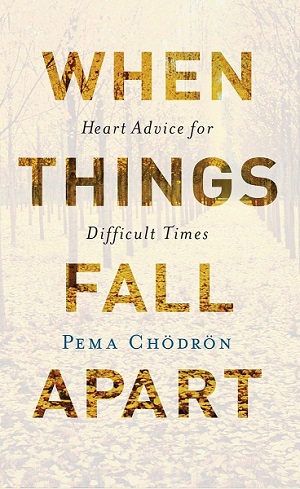Pema Chödrön’s When Things Fall Apart: Heart Advice for Difficult Times is a profound and insightful guide that helps readers navigate life’s most challenging moments. Chödrön, a renowned Buddhist teacher, provides practical and spiritual advice for dealing with suffering, uncertainty, fear, and pain. The book focuses on the Buddhist principles of mindfulness, compassion, and acceptance, offering tools to help individuals find peace amidst chaos. Below are 10 lessons from the book:

Read also: Energize Your Mind
1. Embrace Uncertainty and Impermanence
One of the central teachings in When Things Fall Apart is the idea that life is full of uncertainty and impermanence. Chödrön emphasizes that everything we experience, whether joy or suffering, is temporary. Resisting this reality only leads to more suffering, but embracing it can bring peace and clarity.
- Key Takeaway: Life is unpredictable, and clinging to certainty is futile. Learning to live with uncertainty helps us develop resilience.
- Application: Practice letting go of the need to control everything. Accept that change is inevitable, and learn to flow with it rather than resist it.
Lesson: By accepting the impermanent nature of life, you can reduce suffering and find peace in the present moment.
2. Pain is Inevitable, but Suffering is Optional
Chödrön draws a distinction between pain and suffering. Pain is a natural part of life—it’s inevitable. However, suffering arises from our resistance to pain. Instead of allowing ourselves to feel and process pain, we often try to avoid it, which prolongs and amplifies our suffering.
- Key Takeaway: Pain is a part of life, but suffering comes from our attempts to avoid or resist that pain.
- Application: The next time you experience pain, whether physical or emotional, try to sit with it instead of running away from it. Acknowledge the pain without judgment, and let it pass through you.
Lesson: Embrace pain rather than resist it, and you will reduce unnecessary suffering.
3. Lean into Fear Instead of Avoiding It
Chödrön teaches that fear is a natural response to difficult situations, but our habitual reaction is to avoid it or push it away. This avoidance often leads to more fear. Instead, Chödrön suggests that we lean into fear, acknowledging its presence without letting it control us.
- Key Takeaway: Facing fear head-on allows us to diminish its power over us.
- Application: When fear arises, observe it without judgment. Try to understand what you are afraid of and why, then approach it with curiosity rather than avoidance.
Lesson: Leaning into fear with openness and curiosity helps to reduce its intensity and gives us greater strength to handle life’s challenges.
4. The Power of Mindfulness and Meditation
Mindfulness and meditation are foundational practices in Chödrön’s teachings. Mindfulness helps us stay present and grounded in the moment, while meditation allows us to observe our thoughts and emotions without getting caught up in them. These practices are particularly useful during difficult times, as they provide clarity and calm amidst chaos.
- Key Takeaway: Mindfulness and meditation can help you navigate difficult emotions by allowing you to observe them without becoming overwhelmed.
- Application: Develop a regular meditation practice, even if it’s just for a few minutes a day. Focus on your breath and observe any thoughts or emotions that arise without trying to change them.
Lesson: Mindfulness and meditation offer tools for cultivating inner peace and clarity, even during life’s most difficult moments.
5. Compassion for Yourself and Others
Compassion, both for oneself and others, is a recurring theme in When Things Fall Apart. Chödrön teaches that when we are kind and compassionate toward ourselves, we are better able to extend that same kindness to others. This is especially important during times of suffering, as it helps to alleviate our pain and the pain of those around us.
- Key Takeaway: Compassion is a powerful antidote to suffering, and it begins with being gentle and kind to yourself.
- Application: Practice self-compassion by speaking to yourself with kindness, especially during difficult times. Extend this compassion to others by being understanding and non-judgmental.
Lesson: Cultivating compassion for yourself and others reduces suffering and promotes healing during challenging times.
6. The Importance of Vulnerability
Chödrön teaches that vulnerability is not a weakness but a source of strength. By allowing ourselves to be vulnerable, we open ourselves up to growth, connection, and healing. Often, we try to protect ourselves by building emotional walls, but this only isolates us and deepens our pain.
- Key Takeaway: Vulnerability is a strength that allows for connection, healing, and personal growth.
- Application: Be willing to open up and express your emotions, even if it feels uncomfortable. Share your struggles with trusted friends or loved ones and allow them to support you.
Lesson: Embracing vulnerability leads to deeper connections with others and helps us heal more effectively from emotional wounds.
7. Letting Go of Attachment
One of the causes of suffering, according to Chödrön, is our attachment to things, people, and outcomes. We often cling to the things we desire or the way we want life to be, but this attachment leads to disappointment when things don’t go as planned. Letting go of attachment allows us to experience life as it is, rather than as we want it to be.
- Key Takeaway: Attachment to specific outcomes or desires leads to suffering, while letting go brings freedom and peace.
- Application: Practice letting go of expectations and attachments in your daily life. Focus on being present and accepting whatever comes your way, without trying to control or manipulate it.
Lesson: Letting go of attachment frees you from unnecessary suffering and allows you to experience life with greater peace.
8. The Concept of Groundlessness
Chödrön introduces the concept of “groundlessness,” which refers to the feeling of having no solid foundation to stand on during difficult times. While this feeling can be unsettling, Chödrön suggests that embracing groundlessness is essential for personal growth. It allows us to develop flexibility, adaptability, and openness to new possibilities.
- Key Takeaway: Groundlessness is an opportunity for growth and transformation, even though it may feel uncomfortable at first.
- Application: When you feel like everything is falling apart, try to embrace the uncertainty rather than resisting it. See it as an opportunity to learn, grow, and transform.
Lesson: Embracing groundlessness leads to greater personal growth and resilience in the face of life’s challenges.
9. Life as a Teacher
Chödrön encourages readers to view difficult situations as opportunities for learning. Every experience, whether pleasant or painful, has something to teach us. By adopting this mindset, we can transform suffering into wisdom and use our challenges as tools for personal development.
- Key Takeaway: Life’s challenges are teachers that help us grow and evolve.
- Application: The next time you face a difficult situation, ask yourself, “What can I learn from this?” Shift your perspective from one of victimhood to one of growth and learning.
Lesson: Every difficult situation holds a lesson, and by embracing life as a teacher, we can grow and evolve through our challenges.
10. Practice Non-Judgment
One of the ways we exacerbate our suffering is through judgment—whether we are judging ourselves, others, or our circumstances. Chödrön teaches that practicing non-judgment allows us to accept things as they are without adding unnecessary emotional baggage. This acceptance creates space for peace and clarity.
- Key Takeaway: Non-judgment helps us accept life as it is, reducing unnecessary suffering.
- Application: When you catch yourself judging a situation, person, or yourself, take a step back and observe without labeling anything as good or bad. Simply accept it for what it is.
Lesson: Practicing non-judgment creates a sense of inner peace and acceptance, even during difficult times.
Conclusion
Pema Chödrön’s When Things Fall Apart offers a wealth of wisdom for navigating life’s most challenging moments. The key lessons from the book revolve around accepting life’s uncertainty, embracing pain rather than avoiding it, and cultivating mindfulness, compassion, and vulnerability. Through these practices, we can transform our suffering into opportunities for growth and healing (Amazon).
By applying the lessons from this book:
- You can develop resilience in the face of life’s challenges.
- You can find peace and clarity by embracing uncertainty and impermanence.
- You can reduce suffering by cultivating mindfulness, compassion, and non-judgment.
These lessons are timeless and universally applicable, offering guidance for anyone looking to navigate the inevitable ups and downs of life with greater peace, wisdom, and compassion.



